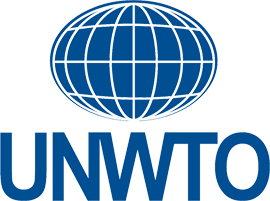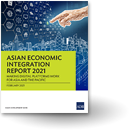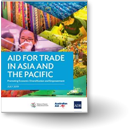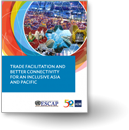Reviving Tourism Amid COVID-19
The Role of Aid-for-Trade
The tourism sector has been one of the most dynamic services sectors prior to the COVID-19 pandemic. For many developing countries, the sector also generated the largest share in services exports. The COVID-19 pandemic has hit the tourism sector particularly hard and abruptly. Reviving the sector is posing major challenges to governments around the world. With a focus on the Asia and Pacific region, this webinar discussed options to help the tourism sector survive and how to prepare for a gradual re-opening. It also analyzed how aid-for-trade can be used strategically to help the sector and to ensure that it delivers in terms of sustainability in the short and long run. The session also presented latest research findings on the future of tourism and how to achieve sustainable outcomes conducted by the Asian Development Bank jointly with the UN World Tourism Organization.
Event details
Date/Venue:
- 9:30–11:00 a.m. (CET)
Wednesday 24 March 2021Online meeting Contacts:
-
- Matthias C. Helble
Senior Economist, Economic Research and Regional Cooperation Department,
Asian Development Bank
Email: mhelble@adb.org
- Paulo Rodelio Marquez. Halili
Senior Economics Officer, Economic Research and Regional Cooperation Department,
Asian Development Bank
Email: phalili@adb.org
- Pia Asuncion P. Tenchavez
Senior Operations Assistant, Economic Research and Regional Cooperation Department,
Asian Development Bank
Email: ptenchavez@adb.org
- Matthias C. Helble
Download:

- Moderator:
 Anna Fink ADBBio
Anna Fink ADBBioAnna Fink is an economist in the Regional Cooperation and Integration Thematic Group in the Sustainable Development and Climate Change Department of ADB. She leads research and technical assistance relating to regional cooperation and integration with a focus on Southeast Asia, the Pacific and particularly regional public goods. This includes an ongoing technical assistance to support tourism cooperation and livestock trade between Indonesia and Timor-Leste. Prior to joining ADB, she worked as a natural resource economist and statistician with the Secretariat of the Pacific Community and as a Consultant on trade facilitation and regional integration in East and Southern Africa. She has a Master’s degree in Development Management from the London School of Economics and has volunteered on several development projects in Africa and South America.
Speakers: Matthias Helble ADBBio
Matthias Helble ADBBioMatthias Helble is a senior economist in the Economic Research and Regional Cooperation Department of the ADB in Manila. Previously, he was a Senior Research Fellow and Co-Chair of the Research Department of ADBI in Tokyo. His research interests include international trade and development. His research has been published in numerous scientific journals as well as in flagship reports of international organizations. His publication record also includes nine books, including with Oxford University Press. His columns and policy work have been published and cited by prominent international media. Matthias began his professional career at the World Bank in Washington, DC, before joining the World Health Organization in Geneva, Switzerland. He then worked as an economist for the World Trade Organization as well as the United Nations. He holds graduate degrees in economics from the University of Tübingen, the University of Wisconsin-Madison, and the Graduate Institute of International and Development Studies (PhD) in Geneva. During his doctoral studies he was a research fellow at Yale University.
 Zoritsa Urosevic UNWTOBio
Zoritsa Urosevic UNWTOBioZoritsa Urosevic is currently the UNWTO Special Representative to the United Nations in Geneva and New York (a.i), and Director of the Institutional Relations and Partnerships Department having joined the World Tourism Organization in 2006. The department provides policy advice for external relations, strategic partnerships and financing for development to the Secretariat, including the integration of the 2030 Agenda and the UN Reform in the organization’s strategic work and delivery. Urosevic is a member of UNWTO’s Global Tourism Crisis Committee (GTCC), strengthening UNWTO and partners response to the current COVID-19 crisis, with a key focus on collaboration with WHO, ICAO and other UN entities and International Organizations (IOs), as well as forging a strategic delivery with International Finance Institutions for recovery and resilience building. She leads the UNWTO work on the Sustainable Development Goals (SDGs) and after publishing the report: “Tourism and SDGS – a journey to 2030”, she created the Tourism for SDGs (T4SDG) platform, a co-creation space for all, to make tourism a key sector for the 2030 Agenda.
From 1993 to 2004, she worked in the Seychelles at the Ministry of Industry and the Ministry of Tourism and Transport, as Director of International Cooperation at regional and global levels. She started her career in France as Export Director for Groupe SOGEXPORT (Bank Societe Generale) in Paris, after completing her Psychology and Business Management studies in Strasbourg.
 Susanne Becken Griffith UniversityBio
Susanne Becken Griffith UniversityBioSusanne Becken is a Professor of Sustainable Tourism at Griffith University in Australia and a Vice Chancellor Research Fellow at the University of Surrey in the United Kingdom. She has published over 100 articles on sustainable tourism, climate change and tourism resource use. Susanne is a member of several advisory boards, including the Air New Zealand Sustainability Advisory Panel and the Whitsunday Climate Change Innovation Hub. Susanne is a Fellow of the International Academy of the Study of Tourism and the 2019 UNWTO Ulysses Award winner.
 Paul Davis Ministry of Foreign Affairs and Trade, New ZealandBio
Paul Davis Ministry of Foreign Affairs and Trade, New ZealandBioPaul Davis joined MFAT in November 2018 and is the Ministry’s in-house tourism specialist, providing a dedicated tourism input into the planning, design, monitoring and review of tourism development programmes which the New Zealand Aid Programme supports.
The role provides technical advice, influences the Ministry’s strategy and programming through tourism sector insights and develops policy advice for tourism. For each country where tourism is an identified priority, Paul provides advice to programming divisions on where to focus across the range of potential investments and interventions. Paul is also the Ministry’s contact and liaison point with the New Zealand domestic tourism sector.
Paul has a detailed background in tourism, especially national and regional tourism organisation strategy and operations including destination planning, marketing and development.
During a 20-year career at the New Zealand Tourism Board and its predecessor the New Zealand Tourism Department, Paul had stints in Auckland, New York, Dunedin and Wellington, Paul set-up and was inaugural CEO of New Zealand Regional Tourism Organisation, Nelson Tasman Tourism. He then took up a role as Long-term Adviser and Programme Manager for the Tonga New Zealand Tourism Support Programme based in Nuku’alofa, and prior to joining MFAT was General Manager Regional Promotions and Tourism at Northland’s Economic Development Agency, Northland Inc.
 Gunay Bayramova State Tourism, Republic of AzerbaijanBio
Gunay Bayramova State Tourism, Republic of AzerbaijanBioGunay Bayramova is the head of the Tourism Industry and Project Management Division at the State Tourism Agency of the Republic of Azerbaijan. After her earning her PhD degree in Political Science from the University of Sheffield, she fully devoted herself to improving public policy making process in her home country. In parallel, she contributes to improving human resources in the tourism sector by sharing her professional experience with students of Azerbaijan Tourism and Management University. Her prior experience includes project coordination at the Ministry of Energy, local consultancy for ADB (CAREC programme) and World Bank projects.
Disclaimer:
- The views expressed on this website are those of the authors and presenters and do not necessarily reflect the views and policies of the Asian Development Bank (ADB) or its Board of Governors or the governments they represent. ADB does not guarantee the accuracy of the data in any documents and materials posted in this website and accepts no responsibility for any consequence of their use. By making any designation of or reference to a particular territory or geographic area, or by using the term “country” in any documents posted in this website, ADB does not intend to make any judgments as to the legal or other status of any territory or area.




